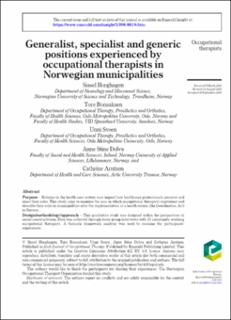Generalist, specialist and generic positions experienced by occupational therapists in Norwegian municipalities
Peer reviewed, Journal article
Published version
Permanent lenke
https://hdl.handle.net/11250/2726926Utgivelsesdato
2020Metadata
Vis full innførselSamlinger
Sammendrag
Purpose – Reforms in the health-care system may impact how health-care professionals perceive and
enact their roles. This study aims to examine the way in which occupational therapists experience and
describe their roles in municipalities after the implementation of a health reform (the Coordination Act)
in Norway.
Design/methodology/approach – This qualitative study was designed within the perspectives of social constructivism. Data was collected through focus group interviews with 10 community-working occupational therapists. A thematic framework analysis was used to examine the participants’ experiences.
Findings – The following four themes emerged: external factors that framed and shaped the occupational therapists’ roles in municipalities; the strengths and dilemmas of the generalist; the problematic generic position and the strengths; and dilemmas of the specialist.
Originality/value – The study suggests that occupational therapy practitioners should identify new opportunities and adapt to health reform changes. They also need to renegotiate their roles as the health reforms require more specialized competences. Greater emphasis must be placed on the core knowledge and competences of occupational therapists to strengthen their professional identity in the municipalities.
Keywords Health-care, Community-based occupational therapy practice, Generalist, Specialist,
Generic role, Core knowledge

